
UCL Faculty of Mathematical and Physical Sciences
Encyclopedia
The UCL Faculty of Mathematical and Physical Sciences is one of the 10 constituent faculties of University College London
(UCL). The Faculty, the UCL Faculty of Engineering Sciences
and the UCL Faculty of the Built Envirornment (The Bartlett)
together form the UCL School of the Built Environment, Engineering and Mathematical and Physical Sciences.
The current Dean is Professor Richard Catlow.
 The Faculty is closely involved with the following research centres and institutes:
The Faculty is closely involved with the following research centres and institutes:
in the Life Sciences and Experimental Biology) is a
inter-disciplinary virtual centre at University College London
that seeks to bring together mathematicians
,
physical scientists
, computer scientists
and engineers
upon the problems posed by complexity
in biology
and biomedicine
.
The centre works with 29 departments and Institutes across UCL. It has a
MRes/PhD program that requires that its students also belong to at least
one of these Departments/Institutes.
The centre is based in the Physics Building on the UCL main campus.
University College London
University College London is a public research university located in London, United Kingdom and the oldest and largest constituent college of the federal University of London...
(UCL). The Faculty, the UCL Faculty of Engineering Sciences
UCL Faculty of Engineering Sciences
The UCL Faculty of Engineering Sciences is one of the 10 constituent faculties of University College London . The Faculty, the UCL Faculty of Mathematical and Physical Sciences and the UCL Faculty of the Built Envirornment together form the UCL School of the Built Environment, Engineering and...
and the UCL Faculty of the Built Envirornment (The Bartlett)
The Bartlett
The Bartlett is the Faculty of the Built Environment at University College London. University College London created the first chair of architecture in 1841, and the school is named after the original benefactor, Sir Herbert Bartlett.-External links:*...
together form the UCL School of the Built Environment, Engineering and Mathematical and Physical Sciences.
The current Dean is Professor Richard Catlow.
Departments
The Faculty currently comprises the following departments:- UCL Department of Chemistry
- UCL Department of Earth Sciences
- UCL Department of Mathematics
- UCL Department of Natural Sciences
- UCL Department of Physics & Astronomy
- UCL Department of Science & Technology Studies
- UCL Department of Space & Climate Physics (Mullard Space Science Laboratory)Mullard Space Science LaboratoryThe UCL Mullard Space Science Laboratory is the United Kingdom's largest university space research group. MSSL is the Department of Space and Climate Physics of the University College London. UCL was one of the first universities in the world to conduct space research...
- UCL Department of Statistical Science
- London Centre for NanotechnologyLondon Centre for NanotechnologyThe London Centre for Nanotechnology is a multidisciplinary research centre in physical and biomedical nanotechnology in London, United Kingdom. It brings together two institutions that are world leaders in nanotechnology, University College London and Imperial College London...
Research centres and institutes

- UCL Centre for Materials Research
- UCL Centre for Mathematics and Physics in the Life Sciences and Experimental Biology (CoMPLEX)
- Centre for Planetary Science at UCL/Birkbeck
- UCL Institute of Origins
- UCL Institute for Risk and Disaster Reduction
- The Thomas Young Centre
CoMPLEX
CoMPLEX (Centre for Mathematics and Physicsin the Life Sciences and Experimental Biology) is a
inter-disciplinary virtual centre at University College London
University College London
University College London is a public research university located in London, United Kingdom and the oldest and largest constituent college of the federal University of London...
that seeks to bring together mathematicians
Mathematics
Mathematics is the study of quantity, space, structure, and change. Mathematicians seek out patterns and formulate new conjectures. Mathematicians resolve the truth or falsity of conjectures by mathematical proofs, which are arguments sufficient to convince other mathematicians of their validity...
,
physical scientists
Physics
Physics is a natural science that involves the study of matter and its motion through spacetime, along with related concepts such as energy and force. More broadly, it is the general analysis of nature, conducted in order to understand how the universe behaves.Physics is one of the oldest academic...
, computer scientists
Computer science
Computer science or computing science is the study of the theoretical foundations of information and computation and of practical techniques for their implementation and application in computer systems...
and engineers
Engineering
Engineering is the discipline, art, skill and profession of acquiring and applying scientific, mathematical, economic, social, and practical knowledge, in order to design and build structures, machines, devices, systems, materials and processes that safely realize improvements to the lives of...
upon the problems posed by complexity
Complexity
In general usage, complexity tends to be used to characterize something with many parts in intricate arrangement. The study of these complex linkages is the main goal of complex systems theory. In science there are at this time a number of approaches to characterizing complexity, many of which are...
in biology
Biology
Biology is a natural science concerned with the study of life and living organisms, including their structure, function, growth, origin, evolution, distribution, and taxonomy. Biology is a vast subject containing many subdivisions, topics, and disciplines...
and biomedicine
Biomedicine
Biomedicine is a branch of medical science that applies biological and other natural-science principles to clinical practice,. Biomedicine, i.e. medical research, involves the study of physiological processes with methods from biology, chemistry and physics. Approaches range from understanding...
.
The centre works with 29 departments and Institutes across UCL. It has a
MRes/PhD program that requires that its students also belong to at least
one of these Departments/Institutes.
The centre is based in the Physics Building on the UCL main campus.

